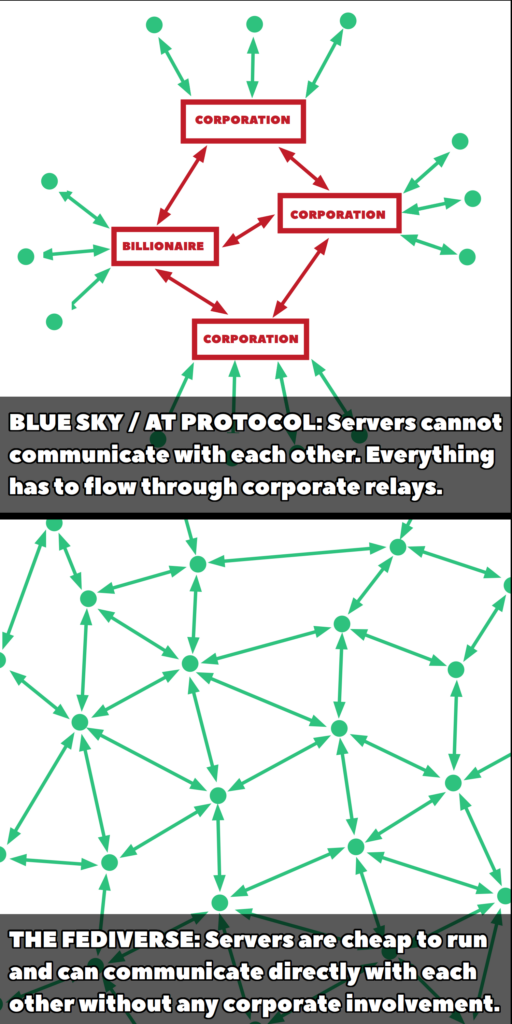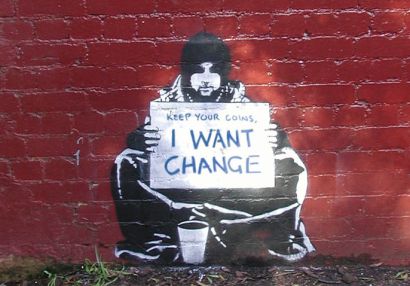Power in tech isn’t neutral, and our issue over the last 20 years is that we have allowed the #dotcons to hoarded and weaponised it. The answer to our failer isn’t to retreat or seek more “ethical” enclosures, it’s to reclaim our power through radical, commons-based networks like #indymediaback and the #OMN.
This argument is #nothingnew, we don’t need endless reinvention, we need continuity. The #openweb isn’t about mimicking #dotcons; it’s about breaking their privatisation model and returning power to collective hands. Hashtags, metadata, and federated networks help on this path, but the real strength is social, not just technical.
Examples of this: #Indymediaback isn’t just a project, it’s a continuation of a proven model that worked before the #dotcons stole the narrative. It was a social technological project embedded in radical movements, used real-world trust systems, and functioned outside of state/corporate control. Rebuilding it isn’t nostalgia; it’s a practical step toward rebalancing power.
We need ongoing arguments about power, opting out or running to “better” #dotcons just dodges the issue. Power is always there. The question is who holds it, and for what purpose? Right now, the #dotcons wield it for social control, profit, and policing. The #openweb flips that, if we build it as a “native” path.
The fight isn’t about making people “feel good” about tech choices, it’s about removing power from enclosures and putting it back into the commons. That’s the difference between real struggle and #fashernista ethics. The latter is comfortable. The former matters.
Paranoia is one of the biggest blockers in alt-tech and radical spaces. It breeds mistrust, isolation, and internal sabotage, making collective action impossible. While some caution is necessary, too much just feeds into stasis and control, mirroring the systems activists are trying to break away from.
The #4opens is a direct antidote to this. Transparency counters paranoia, when decisions, processes, and networks are open, there’s less space for suspicion to fester. Trust isn’t built by secrecy but by consistent, open, and accountable action.
The irony is that a lot of these paranoid actors think they’re resisting control, but by shutting everything down, they’re just self-sabotaging. The solution isn’t more walls—it’s more flows. The #4opens provides the framework to move past the paranoia blockade and rebuild trust in practice, not just theory.
The victimhood narrative is often a trap, weaponised by the right and co-opted by the #fashernista left to shut down alternatives. It can be used as a tool of control, not liberation. Composting the mess, in part, by refuse to play their game, victimhood, is in part real and in part is used to create moral authority without real action. If we engage on those terms, we just get dragged into performative battles.
Expose the power dynamics, by asking who benefits from this? In the negative sense, it’s often gatekeepers who want to control the narrative. NGOs do it for funding, #dotcons for engagement, and #mainstreaming activists for status. A path out of this is reclaiming direct action, which sadly meany in the left abandoned, and the right picked up. We need to take it back, not through reactionary purity politics, but by actually doing the work outside their controlled spaces. A healing path is shifting from identity to process, the current model is all about who is speaking, not what is being built. That’s a dead end. We need #4opens process-driven organising, not personality cults or gatekept “safe spaces.” Make failure visible, one of the biggest weapons against alt movements is pointing out their failures, while #mainstreaming projects hide their rot. If we embrace messy openness, we take that power away.
Breaking the cycle:
- The right weaponises grievance → to mobilise.
- The liberal left weaponises grievance → to control and suppress real challenge.
- The alt-left needs to weaponise transparency → to break gatekeeping and rebuild trust.
So the question is: how do we make “openness” an effective tool in this? The #4opens is a step.







